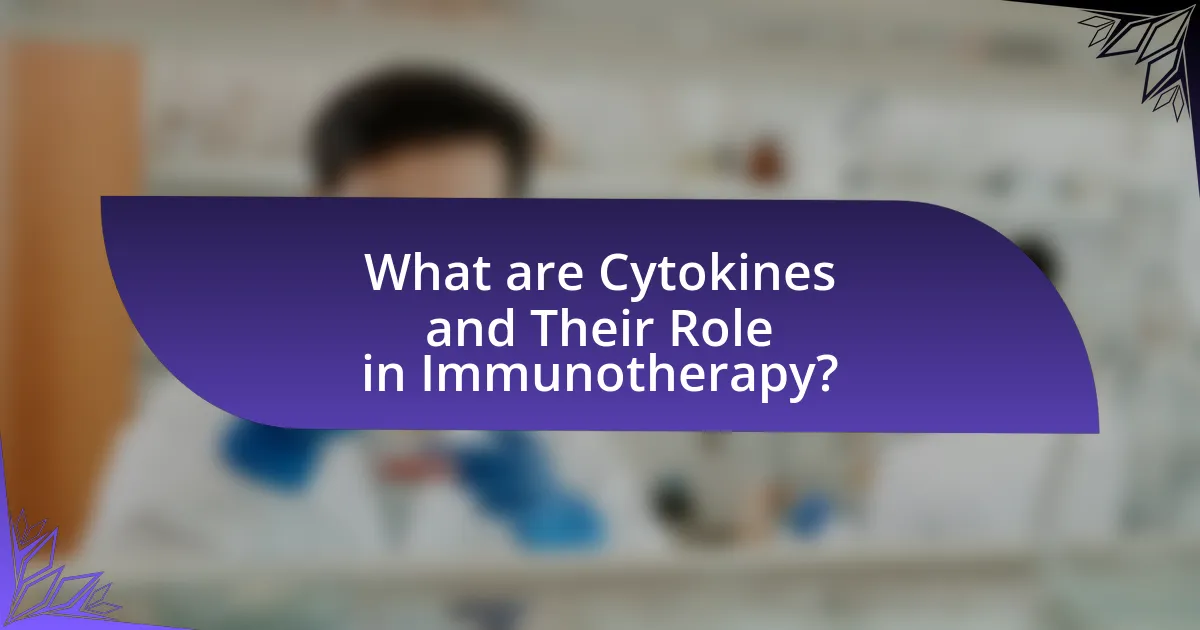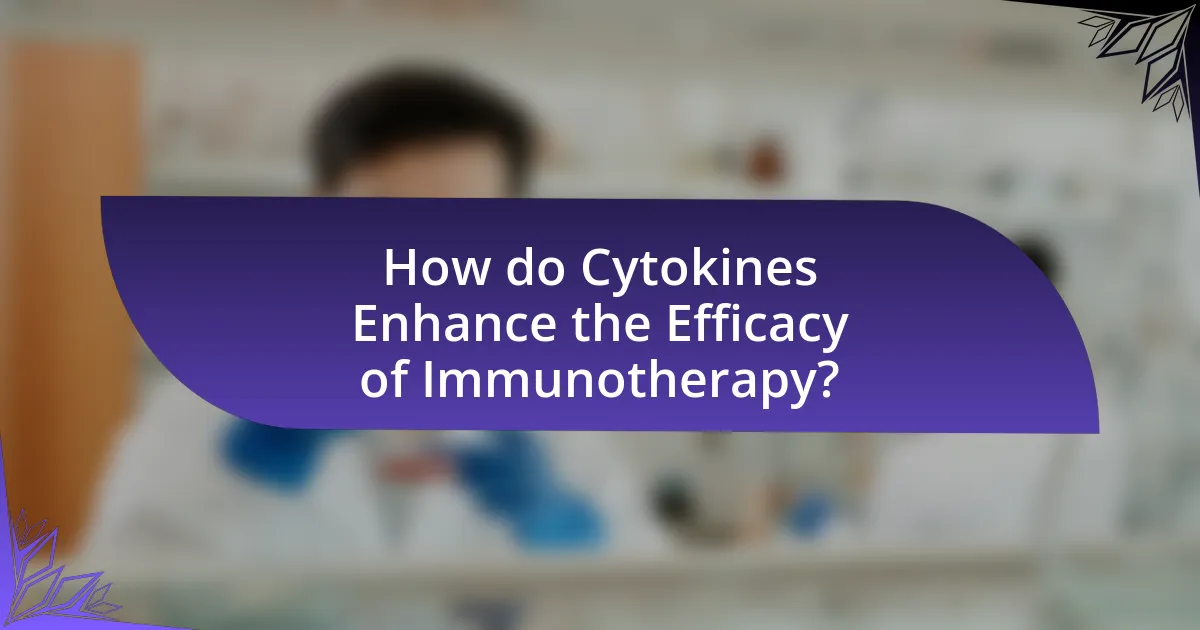Cytokines are small proteins that play a critical role in cell signaling within the immune system, significantly enhancing the efficacy of immunotherapy. This article provides a mechanistic overview of how cytokines, including interleukins, interferons, and tumor necrosis factors, modulate immune responses, promote T-cell activation, and influence tumor microenvironments. It discusses the various types of cytokines involved in immunotherapy, their interactions with immune cells, and the mechanisms through which they boost anti-tumor responses. Additionally, the article addresses the challenges and future directions in cytokine therapies, including potential side effects and strategies to enhance safety and efficacy in clinical settings.

What are Cytokines and Their Role in Immunotherapy?
Cytokines are small proteins that are crucial for cell signaling in the immune system. They play a significant role in immunotherapy by modulating the immune response, enhancing the activity of immune cells, and promoting the destruction of cancer cells. For instance, cytokines like interleukins and interferons can stimulate T cells and natural killer cells, leading to increased anti-tumor activity. Research has shown that therapies utilizing cytokines, such as interleukin-2, can lead to improved outcomes in certain cancer treatments, demonstrating their effectiveness in enhancing the immune response against tumors.
How do Cytokines function in the immune response?
Cytokines function in the immune response by acting as signaling molecules that mediate communication between immune cells. They regulate various aspects of the immune response, including cell proliferation, differentiation, and activation. For instance, interleukins, a type of cytokine, can promote the growth and activation of T cells, which are crucial for adaptive immunity. Additionally, cytokines like tumor necrosis factor-alpha (TNF-α) can induce inflammation and recruit other immune cells to sites of infection or injury. This multifaceted role of cytokines is essential for coordinating an effective immune response, as evidenced by their involvement in both innate and adaptive immunity mechanisms.
What types of Cytokines are involved in immunotherapy?
Cytokines involved in immunotherapy include interleukins, interferons, tumor necrosis factors, and chemokines. Interleukins, such as IL-2 and IL-12, play crucial roles in promoting T-cell activation and proliferation. Interferons, particularly IFN-α and IFN-γ, enhance the immune response by increasing antigen presentation and activating immune cells. Tumor necrosis factors, like TNF-α, are involved in inducing apoptosis in tumor cells and modulating immune responses. Chemokines facilitate the recruitment of immune cells to tumor sites, enhancing the overall efficacy of immunotherapy. These cytokines collectively contribute to the modulation and enhancement of immune responses against cancer.
How do Cytokines interact with immune cells?
Cytokines interact with immune cells by serving as signaling molecules that facilitate communication and coordination among these cells. They bind to specific receptors on immune cells, triggering various responses such as proliferation, differentiation, and activation. For instance, interleukins like IL-2 promote T cell growth and activation, while tumor necrosis factor (TNF) can induce apoptosis in certain cells. This interaction is crucial for mounting an effective immune response, as evidenced by studies showing that cytokine therapies can enhance the efficacy of immunotherapy by improving the activation and function of immune cells against tumors.
Why are Cytokines important for enhancing immunotherapy efficacy?
Cytokines are crucial for enhancing immunotherapy efficacy because they modulate immune responses, promoting the activation and proliferation of immune cells. These signaling molecules facilitate communication between cells, enabling the immune system to recognize and attack cancer cells more effectively. For instance, interleukin-2 (IL-2) has been shown to increase the activity of T cells, which are essential for targeting tumors. Additionally, cytokines can help overcome the immunosuppressive tumor microenvironment by inhibiting regulatory T cells and myeloid-derived suppressor cells, thereby allowing for a more robust anti-tumor response. Studies have demonstrated that combining cytokines with immunotherapeutic agents can lead to improved patient outcomes, highlighting their importance in optimizing treatment strategies.
What mechanisms do Cytokines use to boost immune responses?
Cytokines boost immune responses through various mechanisms, including the activation and proliferation of immune cells, modulation of immune signaling pathways, and enhancement of the inflammatory response. For instance, cytokines like interleukin-2 (IL-2) stimulate the growth and activity of T cells, which are crucial for targeting and eliminating pathogens and cancer cells. Additionally, cytokines such as tumor necrosis factor-alpha (TNF-α) and interferons enhance the expression of major histocompatibility complex (MHC) molecules, improving antigen presentation to T cells. This leads to a more robust immune response, as evidenced by studies showing that cytokine therapy can significantly increase the efficacy of immunotherapy in cancer treatment by promoting T cell activation and persistence.
How do Cytokines influence tumor microenvironments?
Cytokines significantly influence tumor microenvironments by modulating immune responses and promoting tumor growth. They can either enhance or inhibit tumor progression depending on their type and concentration. For instance, pro-inflammatory cytokines like IL-6 and TNF-alpha can create a supportive environment for tumor cells by promoting angiogenesis and suppressing anti-tumor immunity. Conversely, anti-inflammatory cytokines such as IL-10 can lead to immune evasion by dampening the activity of immune cells. Research has shown that the balance of these cytokines within the tumor microenvironment is crucial; a study published in “Nature Reviews Cancer” by Grivennikov et al. (2010) highlights how inflammatory cytokines can drive tumorigenesis by altering the local immune landscape. Thus, cytokines play a pivotal role in shaping the tumor microenvironment, impacting both tumor behavior and the effectiveness of immunotherapy.

How do Cytokines Enhance the Efficacy of Immunotherapy?
Cytokines enhance the efficacy of immunotherapy by modulating immune responses and promoting the activation and proliferation of immune cells. They serve as signaling molecules that facilitate communication between cells, leading to increased immune surveillance and tumor cell destruction. For instance, interleukin-2 (IL-2) has been shown to boost the activity of T cells and natural killer (NK) cells, which are crucial for targeting and eliminating cancer cells. Additionally, cytokines like interferons can enhance the expression of major histocompatibility complex (MHC) molecules on tumor cells, improving the recognition of these cells by the immune system. Studies have demonstrated that combining cytokines with immunotherapeutic agents can lead to improved clinical outcomes, such as increased overall survival rates in patients with various cancers.
What are the specific pathways through which Cytokines enhance immunotherapy?
Cytokines enhance immunotherapy through several specific pathways, including the activation of immune cells, modulation of the tumor microenvironment, and promotion of anti-tumor responses. For instance, cytokines like interleukin-2 (IL-2) stimulate the proliferation and activation of T cells, which are crucial for targeting and destroying cancer cells. Additionally, cytokines such as interferons can alter the tumor microenvironment by increasing the expression of major histocompatibility complex (MHC) molecules, thereby enhancing the recognition of tumor antigens by immune cells. Furthermore, cytokines like tumor necrosis factor-alpha (TNF-α) can induce apoptosis in tumor cells and recruit additional immune cells to the tumor site, amplifying the overall anti-tumor immune response. These mechanisms collectively contribute to the improved efficacy of immunotherapy in cancer treatment.
How do Cytokines modulate T-cell activation and proliferation?
Cytokines modulate T-cell activation and proliferation by acting as signaling molecules that facilitate communication between immune cells. They influence T-cell responses through various mechanisms, including promoting T-cell differentiation, enhancing survival, and stimulating proliferation. For instance, interleukin-2 (IL-2) is crucial for T-cell growth and proliferation, as it binds to the IL-2 receptor on T-cells, triggering signaling pathways that lead to cell division. Additionally, cytokines such as interleukin-6 (IL-6) and tumor necrosis factor-alpha (TNF-α) can further enhance T-cell activation by promoting the expression of co-stimulatory molecules and increasing the production of effector cytokines. This modulation is essential for effective immune responses, particularly in the context of immunotherapy, where enhancing T-cell activity can improve treatment outcomes.
What role do Cytokines play in overcoming tumor resistance?
Cytokines play a crucial role in overcoming tumor resistance by modulating the immune response and enhancing the effectiveness of immunotherapy. They facilitate the activation and proliferation of immune cells, such as T cells and natural killer (NK) cells, which are essential for targeting and destroying tumor cells. For instance, interleukin-2 (IL-2) and interferon-gamma (IFN-γ) have been shown to boost the anti-tumor activity of immune cells, thereby improving the overall response to cancer treatments. Additionally, cytokines can alter the tumor microenvironment, making it less conducive to tumor growth and more susceptible to immune attack. Studies have demonstrated that the administration of specific cytokines can lead to increased survival rates in patients undergoing immunotherapy, highlighting their significance in overcoming resistance mechanisms that tumors often employ.
How do different types of Cytokines contribute to various immunotherapy strategies?
Different types of cytokines play crucial roles in enhancing the efficacy of various immunotherapy strategies by modulating immune responses. For instance, interleukins such as IL-2 and IL-7 promote T cell proliferation and survival, which are essential for effective anti-tumor responses. Tumor necrosis factor (TNF) can enhance the cytotoxic activity of immune cells, while interferons (IFNs) boost the immune system’s ability to recognize and destroy cancer cells. These cytokines can be utilized in combination therapies to synergistically improve outcomes, as evidenced by clinical trials demonstrating that IL-2 administration can lead to significant tumor regression in melanoma patients. Thus, the strategic use of cytokines in immunotherapy not only enhances immune activation but also improves patient responses to treatment.
What is the role of pro-inflammatory Cytokines in checkpoint inhibition?
Pro-inflammatory cytokines play a crucial role in checkpoint inhibition by enhancing the immune response against tumors. These cytokines, such as IL-6, IL-1β, and TNF-α, promote T cell activation and proliferation, which are essential for effective anti-tumor immunity. They also help to overcome the immunosuppressive tumor microenvironment by modulating the expression of immune checkpoint molecules like PD-1 and CTLA-4, thereby facilitating T cell recognition and destruction of cancer cells. Studies have shown that elevated levels of pro-inflammatory cytokines correlate with improved responses to checkpoint inhibitors, indicating their importance in boosting the efficacy of immunotherapy.
How do anti-inflammatory Cytokines affect CAR T-cell therapy?
Anti-inflammatory cytokines can negatively impact CAR T-cell therapy by suppressing T-cell activation and proliferation. These cytokines, such as IL-10 and TGF-β, create an immunosuppressive environment that can inhibit the effectiveness of CAR T-cells in targeting and eliminating cancer cells. Studies have shown that elevated levels of these cytokines in the tumor microenvironment correlate with reduced CAR T-cell efficacy, as they can lead to T-cell exhaustion and decreased cytotoxic function. For instance, research published in “Nature Reviews Immunology” highlights that the presence of TGF-β can significantly impair CAR T-cell activity, demonstrating the critical role of cytokine profiles in determining therapeutic outcomes.

What are the Challenges and Future Directions in Utilizing Cytokines for Immunotherapy?
The challenges in utilizing cytokines for immunotherapy include their potential for causing severe side effects, such as cytokine release syndrome, and difficulties in achieving optimal dosing and delivery methods. These issues arise because cytokines can induce strong immune responses that may lead to toxicity, and their short half-lives complicate sustained therapeutic effects. Future directions involve developing more targeted cytokine therapies, such as engineered cytokines with reduced toxicity profiles and combination therapies that enhance efficacy while minimizing adverse effects. Research indicates that optimizing delivery systems, like nanoparticles or gene therapy approaches, could improve the therapeutic index of cytokines in cancer treatment.
What are the potential side effects of Cytokine therapies?
Cytokine therapies can lead to several potential side effects, including flu-like symptoms, fatigue, fever, chills, and muscle aches. These side effects occur due to the immune system’s activation and the inflammatory response triggered by the cytokines. In some cases, more severe reactions such as hypotension, organ dysfunction, or cytokine release syndrome may also occur, particularly with high doses or specific cytokines like interleukin-2. Studies have shown that these adverse effects are dose-dependent and can vary based on the individual patient’s response to treatment.
How can adverse effects be managed in clinical settings?
Adverse effects in clinical settings can be managed through proactive monitoring, patient education, and the use of supportive therapies. Proactive monitoring involves regular assessments of patients for potential side effects, allowing for early intervention. Patient education ensures that individuals are informed about possible adverse effects and how to report them, which can lead to timely management. Supportive therapies, such as corticosteroids or antihistamines, can be employed to alleviate specific symptoms associated with adverse effects. Evidence from clinical trials indicates that these strategies can significantly reduce the severity and impact of adverse effects, thereby improving patient outcomes and adherence to treatment protocols.
What strategies are being developed to enhance the safety of Cytokine use?
Strategies being developed to enhance the safety of cytokine use include the implementation of targeted delivery systems, such as nanoparticles, which allow for localized cytokine administration, minimizing systemic exposure and associated side effects. Additionally, researchers are exploring the use of engineered cytokines with reduced toxicity profiles, which can maintain therapeutic efficacy while lowering the risk of adverse reactions. Clinical trials are also focusing on combination therapies that pair cytokines with other agents to modulate immune responses more safely. These approaches are supported by studies demonstrating that localized delivery can significantly reduce systemic toxicity, as seen in recent research published in the Journal of Immunotherapy, which highlights the benefits of targeted cytokine therapies in reducing adverse effects while enhancing treatment outcomes.
What are the emerging trends in Cytokine research for immunotherapy?
Emerging trends in cytokine research for immunotherapy include the development of engineered cytokines, combination therapies, and the exploration of cytokine signaling pathways. Engineered cytokines, such as IL-2 and IL-15 variants, are being designed to enhance anti-tumor responses while minimizing side effects. Combination therapies that pair cytokines with checkpoint inhibitors or other immunotherapeutics are showing promise in improving patient outcomes. Additionally, researchers are investigating the role of specific cytokine signaling pathways in tumor microenvironments to better understand their influence on immune responses and therapeutic efficacy. These trends are supported by recent studies demonstrating improved clinical responses and survival rates in patients receiving such innovative treatments.
How are novel Cytokine-based therapies being designed?
Novel cytokine-based therapies are being designed through a combination of genetic engineering, targeted delivery systems, and an understanding of cytokine signaling pathways. Researchers utilize techniques such as recombinant DNA technology to create modified cytokines that enhance their therapeutic efficacy and reduce side effects. For instance, engineered cytokines can be designed to selectively activate immune responses in tumor microenvironments, thereby improving the effectiveness of immunotherapy. Studies have shown that these therapies can lead to better patient outcomes by promoting T-cell activation and proliferation while minimizing systemic toxicity.
What role does personalized medicine play in Cytokine therapy?
Personalized medicine plays a crucial role in cytokine therapy by tailoring treatment strategies to individual patient profiles, enhancing therapeutic efficacy and minimizing adverse effects. This approach utilizes genetic, biomarker, and phenotypic information to select specific cytokines that are most likely to benefit a patient based on their unique immune response and disease characteristics. For instance, studies have shown that patients with specific genetic markers respond better to certain cytokine treatments, leading to improved outcomes in conditions like cancer and autoimmune diseases. By integrating personalized medicine into cytokine therapy, clinicians can optimize treatment regimens, thereby increasing the likelihood of successful immunotherapy outcomes.
What practical considerations should clinicians keep in mind when using Cytokines in immunotherapy?
Clinicians should consider the dosing, timing, and potential side effects when using cytokines in immunotherapy. Proper dosing is crucial, as excessive cytokine levels can lead to severe toxicity, while insufficient doses may not elicit the desired immune response. Timing is also important; administering cytokines at specific intervals can enhance their effectiveness in conjunction with other therapies. Additionally, clinicians must monitor for side effects such as flu-like symptoms, organ dysfunction, and cytokine release syndrome, which can occur due to the activation of the immune system. These considerations are supported by clinical studies demonstrating the relationship between cytokine administration and patient outcomes, emphasizing the need for careful management to optimize therapeutic efficacy.



